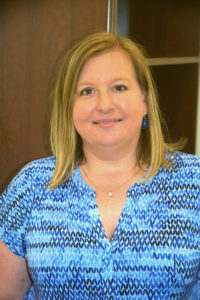Texas A&M hires new soil fertility faculty member in College Station
Writer: Kay Ledbetter, 806-677-5608, [email protected]
Contact: Dr. Julie Howe, 979-845-3814, [email protected]
COLLEGE STATION – Dr. Julie Howe, Texas A&M University soil and crop science department’s newest hire, hopes her research can address some of the challenges to conservation practice adoption by Texas farmers, which seems to be behind other parts of the South.

Howe, associate professor of soil chemistry and fertility who will have a joint appointment with Texas A&M AgriLife Research, came from Auburn University where she held a similar position.
Howe said she is excited to get closer to her family in the Temple area, and while she has enjoyed her career at Auburn, “Texas A&M looked like a place I could do my job maybe bigger and better.”
Howe said her research program primarily focuses on soil chemistry and fertility with an emphasis on the effects of land management on both inorganic and biological processes.
While in Auburn, her research focused on integrating crop and forage/livestock systems to improve overall yield, soil fertility, water management and disease issues in highly erodible soils of the Southeast.
This type of approach, Howe said, has the potential to improve economic productivity and environmental sustainability for producers, while also reducing greenhouse gas emissions and sequestering carbon from the atmosphere.
“There seems to be less adoption of conservation practices here in Texas compared to the Southeast,” Howe said.
“I’m really interested in looking at a nutrient cycling systems approach, which includes incorporating conservation practices and crop rotations into nutrient management considerations,” she said. “I want to see if those practices can be used to improve soil health and conserve the soil as a resource for the future.”
Howe said increased soil fertility of crop production is likely to lead to improved management of nutrients, which will result in better utilization of applied nutrients with less environmental loss.
“Thus, while it directly benefits producers, it indirectly benefits the world,” she said.
Howe explained that fertility is more than just providing sufficient nutrients for plant growth. It is important to provide those nutrients in a manner that is not contributing to environmental pollution. Timing of application, placement, different technologies or methods of application all play a role.
“On every crop, including forage and turf, soil fertility is the key,” she said. “It’s important to make sure we have adequate growth, make sure the plants are healthy and make sure it is done in an economical and also environmentally friendly way.”
Some of the projects Howe worked on at Auburn involved stormwater runoff, raingarden land application of cheese whey wastewater for hay fertility in a manner that reduces impact to nearby streams, and runner peanut response to calcium, boron and manganese.
Additionally, she served as the lead investigator from Auburn on a multi-state program aimed at the assessment of a non-traditional crop rotation scheme incorporating perennial forage grass into the traditional peanut-cotton rotation.
“My role in that project was to evaluate soil organic carbon, carbon sequestration, greenhouse gas emissions, and soil chemical and physical properties associated with this system with the goal of quantifying the benefits and understanding how they manifest,” she said.
Howe is a member of the American Society of Agronomy and was awarded the Outstanding Mentoring Award from them last year. She won the 2015 Early Career Research Award from the Southern Branch of the American Society of Agronomy.


